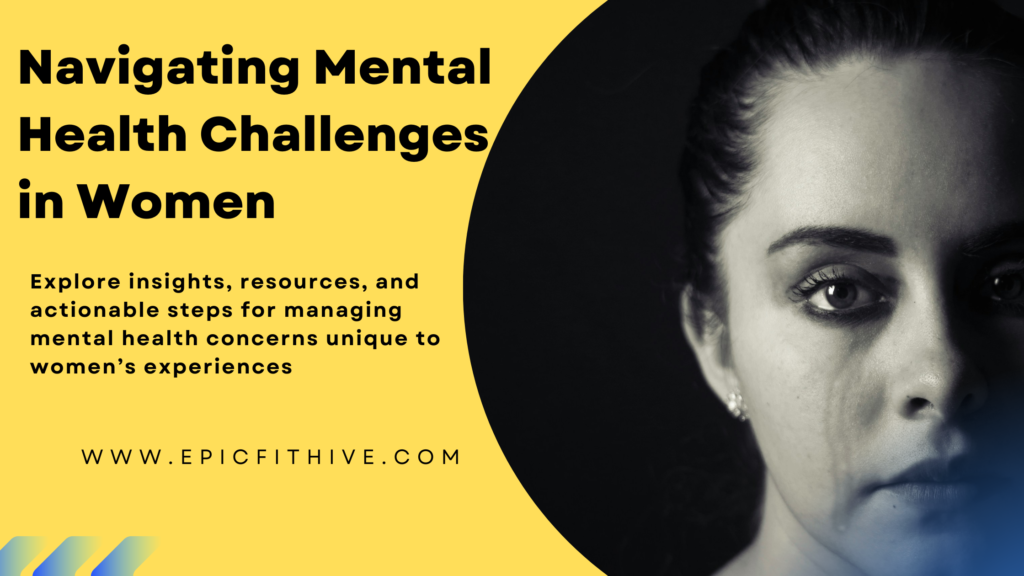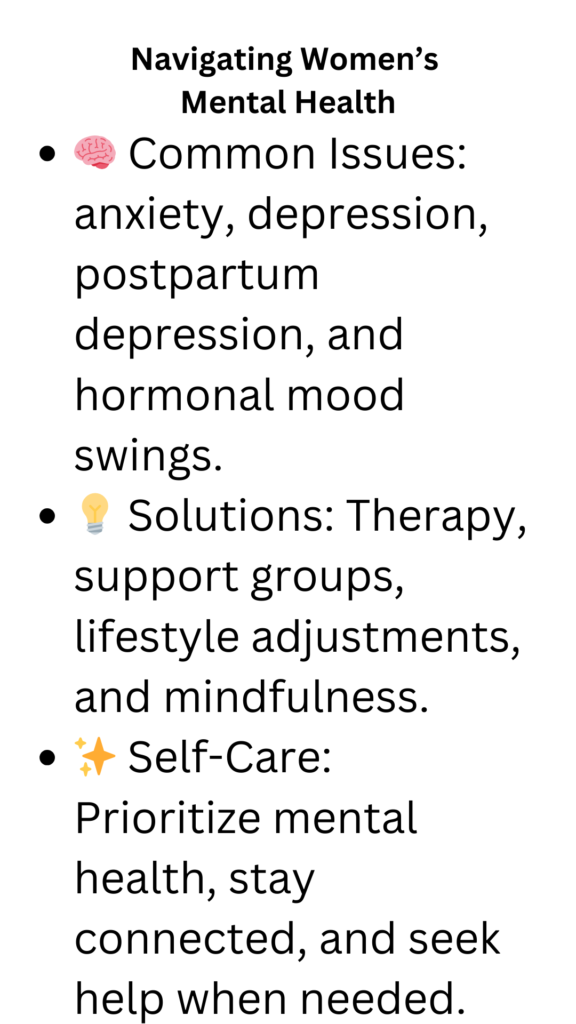Mental health is an integral part of overall well-being, yet many women face unique challenges that can impact their mental health throughout various stages of life. Understanding these issues and knowing how to address them is essential for fostering resilience and maintaining emotional well-being. In this blog post, we will explore common mental health challenges faced by women, their symptoms, and practical solutions to promote mental wellness.

The Importance of Mental Health in Women
Mental health affects how we think, feel, and behave. For women, factors such as hormonal fluctuations, societal pressures, and life transitions can influence mental health in significant ways. Maintaining mental wellness is crucial for emotional stability, healthy relationships, and effective functioning in daily life.

Why Focus on Women’s Mental Health?
Focusing on women’s mental health is essential because:
- Women are more likely to experience certain mental health disorders, such as depression and anxiety.
- Hormonal changes related to menstruation, pregnancy, and menopause can impact mood and emotional well-being.
- Societal expectations and stressors can lead to increased mental health challenges for women.
Common Mental Health Challenges in Women
1. Anxiety Disorders
Anxiety disorders are among the most common mental health issues affecting women. These disorders can manifest as generalized anxiety disorder (GAD), panic disorder, or social anxiety disorder.
Symptoms: Symptoms may include excessive worry, restlessness, fatigue, difficulty concentrating, and physical symptoms like rapid heartbeat or sweating.
Solutions:
- Cognitive Behavioral Therapy (CBT): Consider therapy to help manage anxiety through structured techniques that address negative thought patterns.
- Mindfulness and Relaxation Techniques: Practice mindfulness, meditation, or yoga to help reduce anxiety symptoms.
- Regular Exercise: Engage in physical activity, as it releases endorphins that can improve mood and reduce anxiety.
2. Depression
Depression affects millions of women worldwide and can manifest in various forms, including major depressive disorder and postpartum depression.
Symptoms: Common symptoms include persistent sadness, loss of interest in activities, changes in appetite, fatigue, and difficulty sleeping.
Solutions:
- Seek Professional Help: If you experience symptoms of depression, consulting a mental health professional can provide guidance and treatment options.
- Support Network: Build a support system of friends, family, or support groups to share experiences and feelings.
- Engage in Activities: Participate in activities that bring joy or fulfillment, even when motivation is low. Small steps can help improve mood.
3. Postpartum Depression
Postpartum depression is a serious condition that can occur after childbirth, affecting new mothers both emotionally and physically.
Symptoms: Symptoms may include severe mood swings, feelings of hopelessness, fatigue, and difficulty bonding with the baby.
Solutions:
- Postpartum Support Groups: Joining support groups for new mothers can provide a safe space to share experiences and feelings.
- Therapy and Counseling: Professional therapy can help address feelings of isolation and overwhelming emotions.
- Self-Care: Prioritize self-care, including adequate rest, nutrition, and time for yourself.
4. Hormonal Mood Disorders
Hormonal fluctuations throughout a woman’s life—such as during the menstrual cycle, pregnancy, or menopause—can contribute to mood disorders.
Symptoms: Symptoms can vary widely and may include mood swings, irritability, anxiety, and depressive episodes.
Solutions:
- Track Your Cycle: Keeping a journal of mood changes in relation to your menstrual cycle can help identify patterns.
- Consult a Healthcare Provider: Discussing symptoms with a healthcare provider can lead to effective treatment options, including hormonal therapy if needed.
- Lifestyle Changes: A balanced diet, regular exercise, and stress management techniques can help stabilize mood.
5. Eating Disorders
Eating disorders such as anorexia, bulimia, and binge eating disorder are serious mental health conditions that disproportionately affect women.
Symptoms: Symptoms may include extreme changes in eating habits, excessive focus on weight, and feelings of distress about body image.
Solutions:
- Professional Treatment: Seeking help from a therapist specializing in eating disorders can provide crucial support and guidance.
- Nutrition Counseling: Working with a registered dietitian can help establish healthy eating patterns and address nutritional deficiencies.
- Support Networks: Engaging with support groups can provide a sense of community and understanding.
Tips for Maintaining Mental Health
- Prioritize Self-Care: Make time for activities that bring joy and relaxation, such as hobbies, exercise, or spending time in nature.
- Stay Connected: Foster relationships with friends and family. Social connections can provide support and a sense of belonging.
- Practice Mindfulness: Incorporate mindfulness practices into your daily routine to help manage stress and anxiety.
- Seek Help When Needed: Don’t hesitate to reach out for professional help if you are struggling with your mental health. Early intervention is key to effective treatment.
- Educate Yourself: Understanding mental health can empower you to recognize signs and symptoms in yourself and others, promoting a culture of support and awareness.
Conclusion
Mental health is a crucial aspect of overall well-being for women, influencing many areas of life. By recognizing common mental health challenges and implementing proactive solutions, women can cultivate resilience and foster emotional wellness. If you or someone you know is struggling with mental health issues, remember that seeking help is a sign of strength, and there are many resources available to support you on your journey to better mental health.
Let’s continue to raise awareness about women’s mental health issues and support one another in prioritizing our mental well-being!
